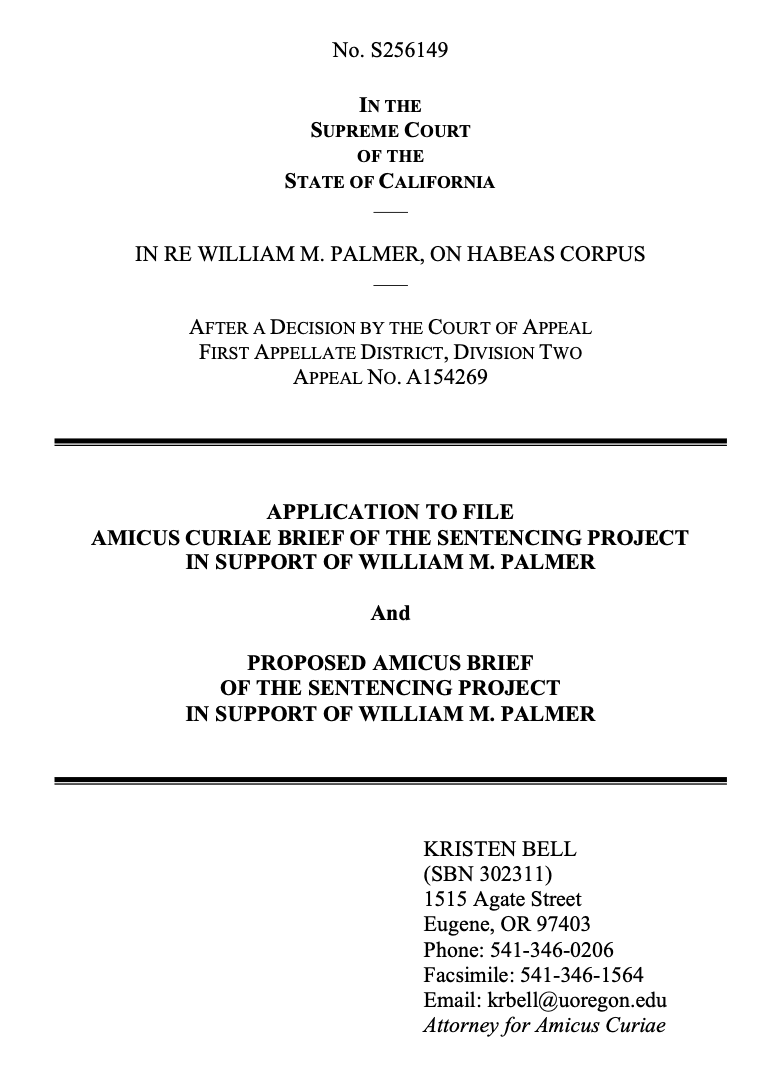
Summary of Argument
Amici argue in Part I of this brief that imposing a mandatory sentence of life with the possibility of parole on juveniles convicted of kidnapping violates the Eighth Amendment. In determining whether a punishment is cruel or unusual as applied to a category of people convicted of a type of crime, the Eighth Amendment calls for a two-step analysis. See Graham v. Florida (2010) 560 U.S. 48, 61, as modified (July 6, 2010). First, the court looks to evidence of a national consensus against the punishment in question by reviewing the numbers of people serving it and applicable statutes nationwide. Second, the court applies its independent judgment in analyzing whether the punishment is justified by any of the traditional rationales for punishment - retribution, deterrence, incapacitation, or rehabilitation. In both steps of the analysis, the Court distinguishes punishment that is imposed on a mandatory basis from punishment that is imposed on a discretionary basis. (See Miller v. Alabama (2012) 567 U.S. 460, 477, 483.)
To assist the Court in this analysis, Appendix B lists jurisdictions where a life sentence is mandatory, discretionary, or not available for the most severe type of kidnapping as defined by each jurisdiction. Appendix A lists the numbers of people serving a life sentence for the controlling offense of kidnapping as a juvenile. These appendices provide evidence of a national consensus against mandatory life sentences for juveniles convicted of kidnapping that is stronger than the evidence of consensus that the Supreme Court relied on in Miller and Graham. (See infra at 20.) Further, amici show that a mandatory life sentence with the possiblity of parole for juveniles convicted of kidnapping is not justified by any of the traditional rationales for punishment.
In Part II of this brief, amici argue that section 209(b) is unconstitutional as applied to juveniles under Article I, section 17 of the California Constitution. The analysis is guided by In re Lynch (1972) 8 Cal.3d 410, in which this Court held that Penal Code section 314 violated the cruel or unusual punishment because it imposed a sentence of one year to life for the conviction of second-offense indecent exposure. (See id. at 413.) The Lynch court applies a settled rule of California constitutional law which amici is that, when determing whether a statute is unconstitutional, courts consider whether the maximum period of incarceration authorized by statute is proportionate to the offense. (See id. at 415-416.) The question under Article 1 thus should be framed as follows: is the maximum period of incarceration authorized by section 209(b) an entire lifetime of imprisonment disproportionate to the offense of kidnapping for the purpose of robbery committed by a juvenile? The answer is yes: an entire lifetime behind bars, beginning at age 17, is grossly disproportionate to an offense that need not include any actual, attempted, or intended bodily injury to a victim.
In Part III of this brief, amici turn to the alternative argument that even if section 209(b) is constitutional particular application , section 17 as well as the Eighth Amendment. The analysis here involves three steps: first, looking to the characteristics of the individual and the offense, second to punishments for more serious crimes within the state, and third to punishments for similar crimes in other jurisdictions. (See id.) Amici focus only on the third part, the interstate comparison. Appendix C details the range of sentences that a person similarly situated to Mr. Palmer would have received in 52 jurisdicitons under statutes current as of March, 2020. Unlike Appendix B, which considers sentencing for the most severe type of kidnapping available in a given jurisdiction, Appendix C is tailored to the facts of Mr. a kidnapping committed by a juvenile for the purpose of robbery, with a firearm, and without bodily injury or other aggravating factors.
A mandatory sentence of life with the possibility of parole is extremely rare for such an offense. It is available in only two other jurisdicitons Lousiaiana and Utah and there are only 8 individuals serving a life sentence for kidnapping as juveniles in those jurisdictions. (See Appendices A and C.) In stark contrast to the one-size-fits-all approach taken by California, other jurisdictions provide a range of sentencing options for juveniles convicted of a a crime similar to Mr. between the minimum sentence a juvenile can receive and the maximum sentence an adult can receive for a crime similar to Mr (See infra at 63.)
For these reasons, an indeterminate life sentence under section 209(b) at age 17 In re Lynch (1972) 8 Cal.3d 410, 424.)